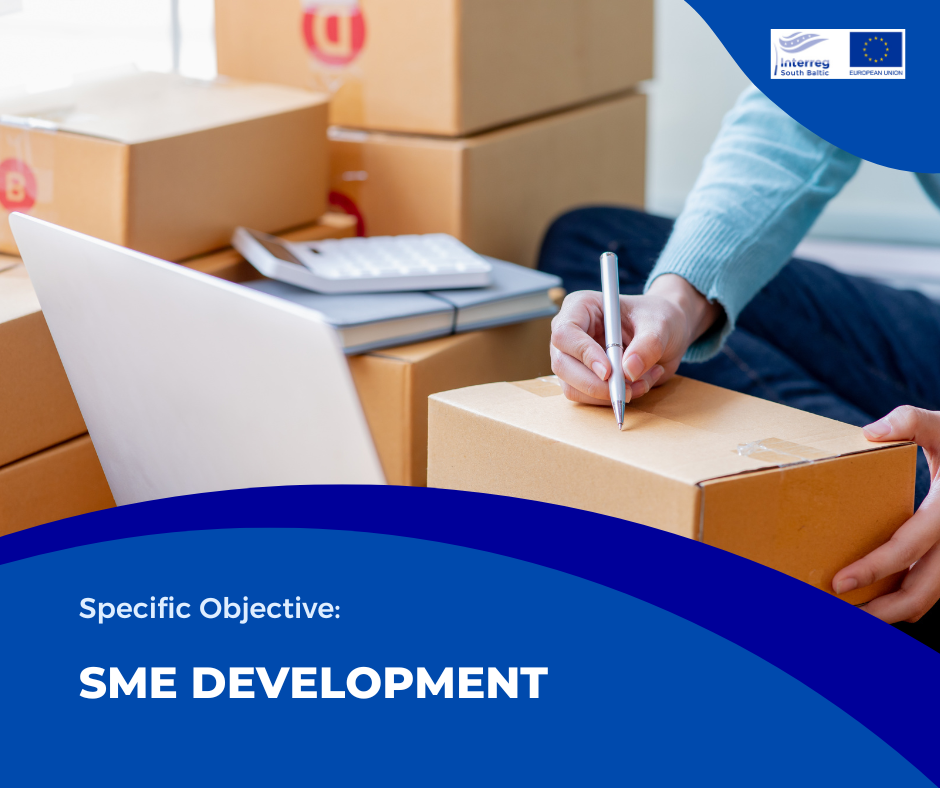The South Baltic Area (SBA) economy is reliant on small- and medium- sized enterprises operating in a wide variety of sectors, with a strong role of blue and green sectors. At the same time, rapid development of these sectors depends highly on the innovation and internationalization level, as well as cooperation with R&D institutions.
There are still territorial disparities in SME innovation capacity and internationalisation level between the north-western and the south-eastern parts of the SBA as well as between the urban and rural territories. This situation weakens the convergence processes between the regional economies.
It is worth to underline that the COVID-19 pandemic has highlighted more than ever the need to increase the level of digitisation of actors in the local economy in order to ensure the proper functioning of various branches of the economy in the rapidly changing external conditions.
The SBA is characterized by promoting and developing innovative sectors, as well as a very good scientific and research base in the form of many recognized universities and R&D institutions. There is still an untapped potential for the SBA economic development by stimulating SMEs to technological transformation and internationalisation.
The Measures and actions foreseen within this Priority Axis of the ISBP 2014-2020 are aimed at raising the innovation capacity of local actors but also to increase their level of internationalization. It aims to help mitigate growing disparities in the economic standings between South Baltic urban and rural areas, as well as help maintain adequate economic growth rate.
There are two Programme Measures in the ISBP 2021-2027 that constitute PRIORITY 1; Innovative South Baltic: Digitalisation and Internationalisation.
- Programme Measure 1.1; Digitalisation. The SBA has an significant economic potential, especially in sectors related to the blue and green economy, nevertheless in order to ensure that it is adequately developing towards a knowledge-based and innovative, it still requires to be simulated and supported. Moreover, the digitisation processes are closely related to the digital pillars of the European Commission concerning strengthening solutions in the field of i.a. artificial intelligence, cybersecurity, digital skills, connectivity, etc. Thus, the actions under this Measure will support the process of achieving the goals defined by the European Commission.
- Programme Measure 1.2; Internationalisation. The economic growth of the SBA requires actions dedicated to the enhancement of SMEs competitiveness, innovativeness, as well as their presence on the international market. Consequently, the expansion of SMEs within and beyond the SBA requires efficient cross-border learning and networking platforms, business advisory services and matchmaking actions to assist them in moving from domestic to international business practices.
At the same time, the internationalisation of the SBA economy creates new opportunities for cross-border cooperation and promotion of the South Baltic Area outside its borders. There is a strong potential for technology transfer and cooperation between enterprises, research centres and higher education sector to foster innovative solutions.
As part of the 4th Seed Money Call of ISBP 2014-2020, six projects have been selected under Specific Objective 1.1; SME Internationalisation, and have the ambition to apply for the Priority 1 in the ISBP 2021-2027; Innovative South Baltic and Priority 2 in the ISBP 2021-2027; Sustainable South Baltic, respectively, they are: BALTIC MANORS, BaltiCE, BePacMan, Enabling Greener Life Science SMEs, FEA and FLSSB.
- BALTIC MANORS will enhance the presence of manor tourism SMEs on international markets and the competitiveness of SMEs in economically weak parts of the South Baltic Programme area.
- BaltiCE plans to develop a toolbox of innovative solutions to improve the circular economy approach in sensitive areas to save resources and make the most of the available materials and to mitigate the impacts of climate change.
- BePacMan aims to focus on cardboard packaging and reusing to keep the packaging in its proper shape in circulation as long as possible.
- Enabling Greener Life Sciences SMEs has the objective to develop business support for life science SMEs where sustainability is used as a tool to strengthen SMEs’ strategy, business case development and growth.
- FEA intents to increase the innovation capacity of the South Baltic Foodtech sector giving access to new knowledge and infrastructures which will enable the South Baltic competitiveness with regard to resilient, sustainable, healthy and environmentally friendly food production.
- FLSSB aspire to develop local and circular supply chains for food and using side-steams for biofertilizer production and as raw materials.

